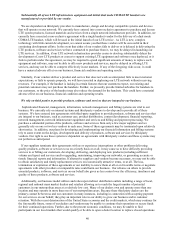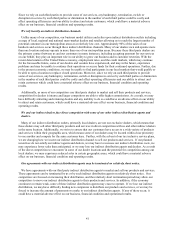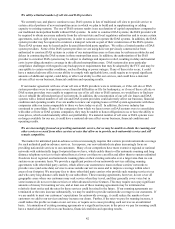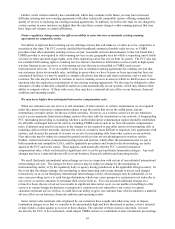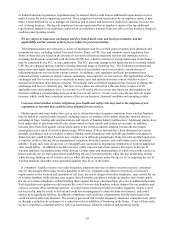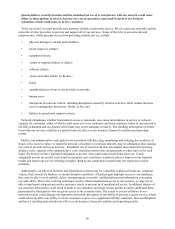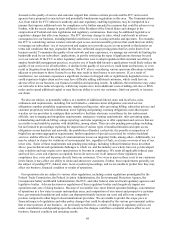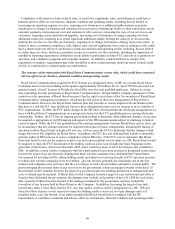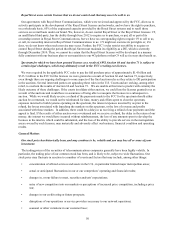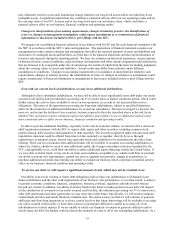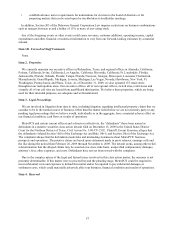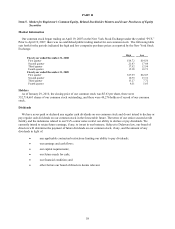Metro PCS 2009 Annual Report Download - page 60
Download and view the complete annual report
Please find page 60 of the 2009 Metro PCS annual report below. You can navigate through the pages in the report by either clicking on the pages listed below, or by using the keyword search tool below to find specific information within the annual report.48
focused on the quality of service and customer support that wireless carriers provide and the FCC and several
agencies have proposed or enacted new and potentially burdensome regulations in this area. The Communications
Act, from which the FCC obtains its authority and state regulatory enabling legislation, may be interpreted in a
manner that imposes additional costs for compliance or be further amended in a manner that could be adverse to us.
Further, with the recent change in party affiliation of the President of the United States and changes in the
composition of Federal and state legislatures and regulatory commissions, there may be additional legislative or
regulatory changes that affect our business. The FCC also may change its rules, which could result in adverse
consequences to our business, including harmful interference to our existing networks and spectrum. For example,
the FCC is considering various wireless network open access and net neutrality policies that could limit our ability
to manage our subscribers’ use of our network and require us to provide access on our network to third parties on
terms and conditions that may jeopardize the flat-rate, unlimited usage pricing plans that lies at the heart of our
business model. To maintain the quality of our network and user experience, we manage our network by limiting the
bandwidth used by our subscribers’ applications, in part by restricting the types of applications that may be used
over our network. If the FCC or other regulatory authorities were to adopt regulations that constrain our ability to
employ bandwidth management practices, excessive use of bandwidth-intensive applications would likely reduce the
quality of our services for all subscribers. A decline in the quality of our services could harm our business, or even
result in litigation from dissatisfied subscribers. The FCC also is considering various spectrum allocations in bands
adjacent or proximate to those licensed to us that may result in interference to our systems. If, as a result of
interference, our customers experience a significant increase in dropped calls or significantly degraded service, we
could experience higher churn and we may have difficulty adding additional customers, which could have an
adverse effect on our business, our financial condition and operating results. In addition, the interference may cause
our networks to have reduced capacity, which may require us to incur additional costs of adding cell sites or DAS
nodes and to spend additional capital or may limit our ability to serve our customers, limit our growth, or increase
our churn.
We also are subject, or potentially subject, to a number of additional federal, state, and local laws, rules,
ordinances and requirements, including, but not limited to, common carrier obligations; universal service
obligations; number portability requirements; number pooling rules; rules governing billing, subscriber privacy and
customer proprietary network information; tower lighting and painting; roaming obligations; rules that require
wireless service providers to configure their networks to facilitate electronic surveillance by law enforcement
officials; rate averaging and integration requirements; emergency warning requirements; rules governing spam,
telemarketing and truth-in-billing; outage reporting; and rules requiring us to offer equipment and services that are
accessible to and usable by persons with disabilities, among others. There are also pending proceedings including,
but not limited to proceedings exploring the imposition of various types of nondiscrimination and open access
obligations on our handsets and networks; the prohibition of handset exclusivity; the possible re-imposition of
bright-line spectrum aggregation requirements; further regulation of special access used for wireless backhaul
services; and the effects of the siting of communications towers on migratory birds, among others. Additionally, we
may be subject to claims for violations of environmental law, regardless of fault, as a lessee or owner of any of our
tower sites. Some of these requirements and pending proceedings, including without limitation those described
above, pose technical and operational challenges to which we, and the industry as a whole, have not yet developed
clear solutions and may require us to spend money to become in compliance. We remit all applicable federal, state
and local fees, costs and expenses as required, but we do not recover in all instances these regulatory and
compliance fees, costs and expenses directly from our customers. If we were to pass on these costs to our customers
in the future, it may affect our ability to retain and attract new customers. Further, these requirements generally are
the subject of pending FCC, federal, state, local or judicial proceedings, and we are unable to predict how they may
affect our business, financial condition or results of operations.
Our operations also are subject to various other regulations, including certain regulations promulgated by the
Federal Trade Commission, the Federal Aviation Administration, the Environmental Protection Agency, the
Occupational Safety and Health Administration, the FCC, and other federal, state and local regulatory agencies and
legislative bodies. Adverse decisions or regulations of these regulatory bodies could negatively impact our
operations and costs of doing business. Because of our smaller size, more limited spectrum holdings, concentration
of operations in a few states in major metropolitan areas, and composition of our current and prospective customer
base, governmental regulations and orders can disproportionately increase our costs and affect our competitive
position compared to other larger telecommunications providers. We are unable to predict the scope, pace or
financial impact of regulations and other policy changes that could be adopted by the various governmental entities
that oversee portions of our business. As previously noted herein, a variety of changes in regulatory policies are
under consideration and depending upon the outcomes, the changes could have a material adverse effect on our
business, financial condition and operating results.




